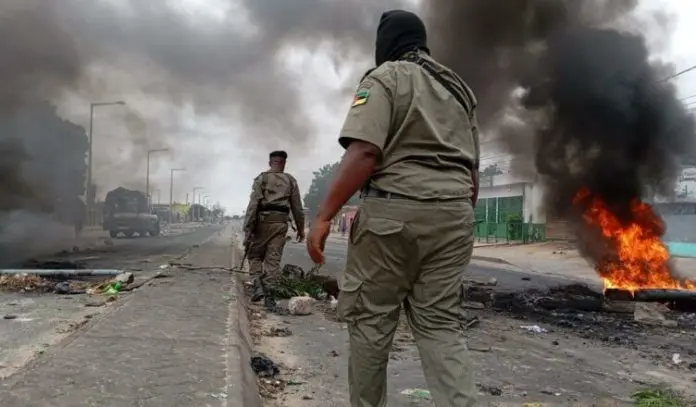- P.O. Box: 11482 Yaoundé, Cameroon; Headquarters: Efoulan, Yaoundé 3
- contact@caessinternational.org

Post-Election Violence in Mozambique: The African Union’s Call for Calm
Mozambique is currently facing a wave of post-election violence that erupted following the announcement of the electoral results on October 24, 2024. The electoral commission declared that Daniel Chapo, the candidate of the ruling party FRELIMO, had won the presidential election with 71% of the vote. These results were contested by the opposition, which alleged fraud and electoral manipulation. In response, the opposition called for peaceful protests, which began in several cities, including the capital, Maputo. However, these demonstrations quickly escalated into violence, marked by clashes between protesters and security forces.
The initial wave of violence lasted about a week, from October 25 to November 1, 2024. During this period, dozens of people were injured or arrested, and property was destroyed. In response, the authorities deployed additional security forces to the affected areas. However, the government's measures to restore order were criticized by some observers as excessive and disproportionate. According to the latest reports, the number of victims resulting from the clashes between protesters and police has risen to over 100. In light of this situation, international reactions have emerged, including calls for restraint and dialogue from the African Union, the United Nations, and other organizations.
The African Union responded swiftly by issuing a call for calm. Moussa Faki Mahamat, Chairperson of the AU Commission, urged the authorities and political actors to prioritize dialogue and avoid all forms of violence. The AU’s appeal for calm is a step in the right direction, but it is crucial that all stakeholders work together to find a peaceful and lasting solution to the crisis. UN Secretary-General António Guterres also expressed concern over the violence and called for restraint.
These post-election incidents highlight the deep-seated tensions and divisions within the country. Authorities must take concrete measures to address the concerns of the opposition and the broader population, while ensuring the respect of human rights. International organizations must also maintain an active role in promoting peace and stability in the region. The consequences of the violence are already evident. The country’s economy has suffered losses estimated in the millions of dollars. Foreign investments have been affected, with some companies suspending their operations. Civilians have also been impacted, with injuries and displacements reported. Humanitarian organizations such as IOM, CARE, and SOLIDARITÉS INTERNATIONAL have issued appeals for aid to meet the urgent needs of affected populations.
In conclusion, the post-election violence in Mozambique is a matter of international concern. Authorities must take measures to address the grievances of the opposition and the population, while ensuring that human rights are respected. International partners must continue to play an active role in fostering peace and stability in the region. Ultimately, all stakeholders must work together to find a peaceful and lasting resolution to the crisis.